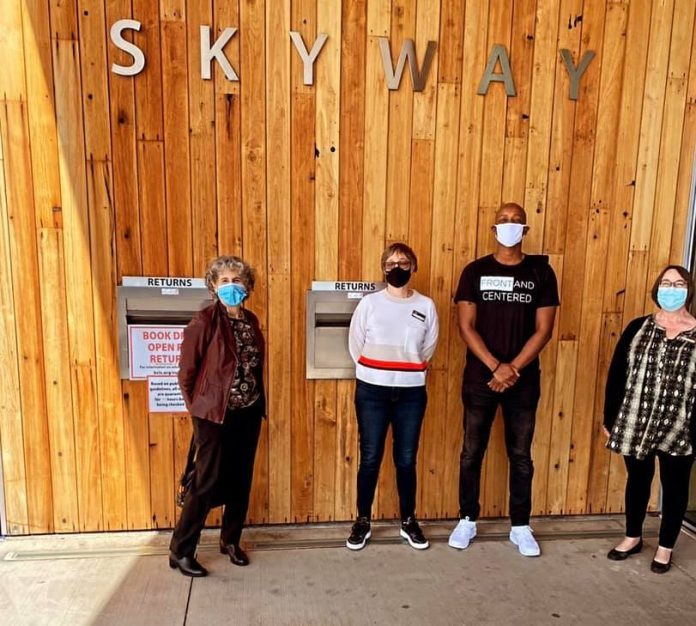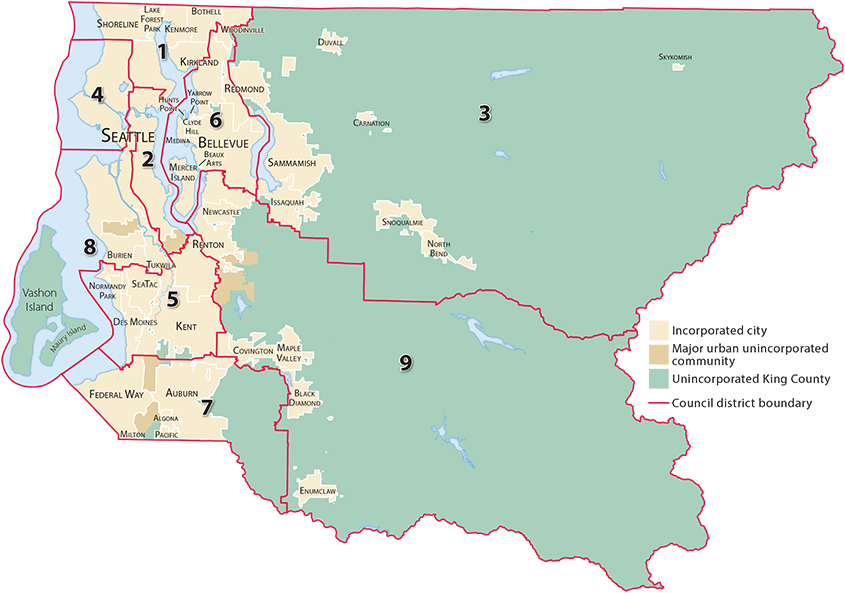
In a 6-3 vote yesterday, the King County Council approved a bill greatly expanding tenant rights in unincorporated King County. Sponsors Girmay Zahilay, Jeanne Kohl-Welles, and Dave Upthegrove introduced the legislation in March, but they ran into headwinds as the Rental Housing Association of Washington (RHA), which represents landlords, fiercely opposed it. County Councilmember Kathy Lambert also threw up roadblocks and proposed a litany of striker amendments in committee. Lambert and colleagues Reagan Dunn and Pete von Reichbauer were the “no” votes. All three are Republicans and up for re-election in an increasingly left-leaning county.
The ordinance establishes a “Just Cause” eviction protection that requires landlords to state a reason in order to end a tenancy — acceptable reasons include nonpayment of rent, criminal activity, the landlord moving into the rental, or the tenant violating lease terms. Municipalities like Seattle, Federal Way, and Auburn previously passed Just Cause laws, and the State Legislature also passed a statewide Just Cause law earlier this year, though its weaker than most municipal versions. (Municipal ordinance takes precedence over County ordinances on landlord-tenant issues.)
Moreover, the bill caps move-in fees and deposits to one month’s rent and late fees to 1.5% or less. The bill requires that landlords give a 120-day notice if they plan to increase rent by more than 3%. When landlords plan to evict or not renew a tenants’ lease, they must provide at least a 30-day notice under the new ordinance.
Unincorporated King County — which includes communities like Skyway (where Zahilay resides) and White Center — accounts for 20% of the “no cause” evictions in the county despite representing just a tiny fraction of the renters in the county. Those unincorporated communities are also some of the most racially diverse in the county, which helps explain why the majority of evictions hit Black and brown households despite their relatively small share of the county’s population. The higher incidence of evictions in communities of color is in turn linked to the disproportionately high share of Black, Indigenous, and people of color in the county’s homeless population.

“We are not in normal times.”
“We are not in normal times,” Councilmember Zahilay said. “There’s a pandemic, our planet is on fire, and our housing crisis continues to leave people on the streets. Keeping people indoors is more important now than ever. Strong tenant protections are critical and I’m proud we were able to advance them today.”
The pandemic has led to massive upheaval in the rental market, with Americans accruing more than a trillion dollars in housing debt as millions of jobs disappeared and millions suffered through severe cases of Covid-19 that disrupted their ability to work. Governor Jay Inslee enacted an eviction moratorium and froze rents in April 2020 to protect tenants who lost income during the pandemic from falling into homelessness. He’s renewed it every few months since and just issued a “bridge” extension last week that winds down the protections by September 30th. The bridge is intended to link up with rental assistance so that tenants can clear their housing debts, but disbursing that rental assistance has hardly been a seamless process and many tenants have fallen between the cracks.
Tenant advocates have warned of a tsunami of evictions as the eviction moratorium is lifted and landlords go after tenants behind on rent. That’s what has spurred the tenant rights push we’ve seen in the region and across the nation.
Stay Housed Stay Healthy Coalition celebrates victory
A number of pro-tenant local organizations formed the Stay Housed Stay Healthy coalition and rallied behind the county package and fought back against striker amendments. The Urbanist was one of the groups to join this coalition, and I offered public comment in favor of the legislation on behalf of our organization.
Coalition members hailed the bill’s passage as a major win. Among them was the Housing Justice Project of the King County Bar Association, which is one of the primary legal aid providers to tenants in the region. “This is a HUGE victory and would not have happened without the support of the community who participated in HOURS of public comment,” the House Justice Project tweeted.
Likewise, the RHA-led landlord lobby whipped up their members to provide public comment, and often resorted to misinformation to make their case, as we reported earlier this month. In a head-scratching move, some landlords even argued evictions were not related to homelessness despite the preponderance of evidence showing evictions are one of the major pathways into homelessness.
Small landlord exemption rejected
Stay Housed Stay Healthy members showed up in droves to counteract the many wayward landlord narratives and succeeded in beating back a Dunn amendment that would have established a small landlord exemption set for individuals who own four or fewer rentals. Advocates argued this loophole would end up being quite broad and complicate enforcement since landlords often establish separate legal entities like LLCs to hold each property separately, which can obscure ownership. The amendment was defeated in a 6-3 vote that mirrored the final vote on the bill.
In her Crosscut column, Katie Wilson, General Secretary of Transit Riders Union and one of the leaders of the Stay Housed Stay Healthy Coalition said that small “mom and pop” landlords have often been used by a political shield by corporate landlords, who statistically are the most prolific evictors, at about two to three times the rates of small landlords, according to a recent study. While less frequent in occurrence, small landlords still wield evictions in a very damaging way, whether intentionally or through cognitive bias, which makes a small landlord exemption a bad idea, she argued.
“There’s a strong racial dimension to smalltime landlordism, too. Thanks to our region’s history of racial segregation and discrimination in housing, combined with all the other factors preventing Black and other families of color from accumulating generational wealth, mom and pop landlords as a class are overwhelmingly white,” Wilson wrote. “In a 2018 survey of over 4,000 Seattle landlords, 82% of respondents who answered the question about race reported being white. Meantime, in 2017, only 65% of Seattle renters were white, and over half of individuals with evictions filed against them were people of color; 31% were Black. These stark disparities create potential for racial discrimination in the tenant screening process as well as in evictions.”
Fine-tuning the bill
In the four-hour long meeting, Councilmembers worked through a number of issues that had been identified with the bill. One sticking point was an attempt to ban requiring Social Security numbers (SSN) in rental applications, which Zahilay and Kohl-Welles explained was intended to prevent discrimination against immigrants who don’t have an SSN. Landlords claimed this would prevent credit checks and background checks, but Councilmembers confirmed that credit agencies can run credit checks without an SSN, since most non-naturalized immigrants have an Individual Taxpayer Identification Number (ITIN) that also suffices.
While most County Councilmembers appeared to agree with the legislative intent to prevent discrimination against immigrants, County Councilmember Rod Dembowski advocated for and got a change clarifying that landlords can still deny applications if their attempts to use other means to ascertain credit history and background turn up no results. Tenant advocates worried this seemingly small loophole could be exploited to effectively screen out people without SSNs.
Looking ahead
While it wasn’t the smoothest path to passage, the tenant rights package shepherded by Zahilay and Kohl-Welles came in the nick of time to help tenants still reeling from the pandemic. Having a long-time renter in Girmay Zahilay on the council long dominated by landowners, landlords, and corporate real estate attorneys is making a world of difference. Both his first and last name rhyme with ‘my guy’ for all the landlords that were struggling with the pronunciation in public comment. You might want to learn the name because I expect you’ll be hearing a lot more from him.
Correction: An earlier version incorrectly stated Renton has a municipal Just Cause law. It does not, but Auburn does.
Doug Trumm is publisher of The Urbanist. An Urbanist writer since 2015, he dreams of pedestrianizing streets, blanketing the city in bus lanes, and unleashing a mass timber building spree to end the affordable housing shortage and avert our coming climate catastrophe. He graduated from the Evans School of Public Policy and Governance at the University of Washington in 2019. He lives in East Fremont and loves to explore the city on his bike.


